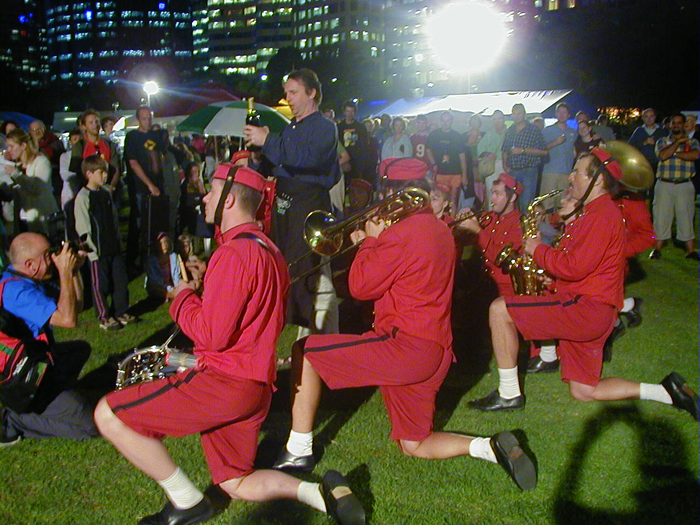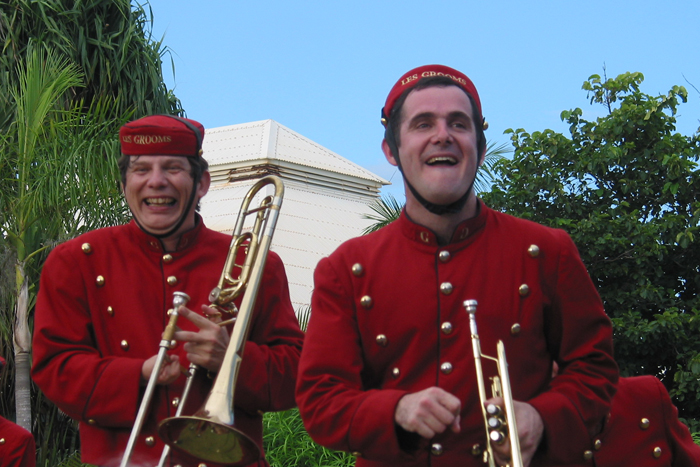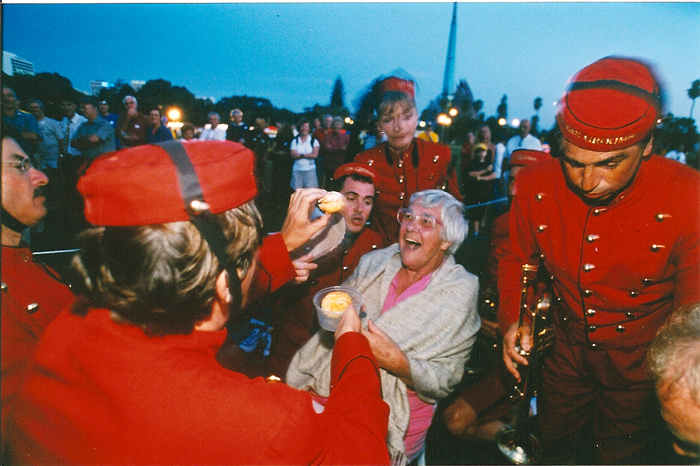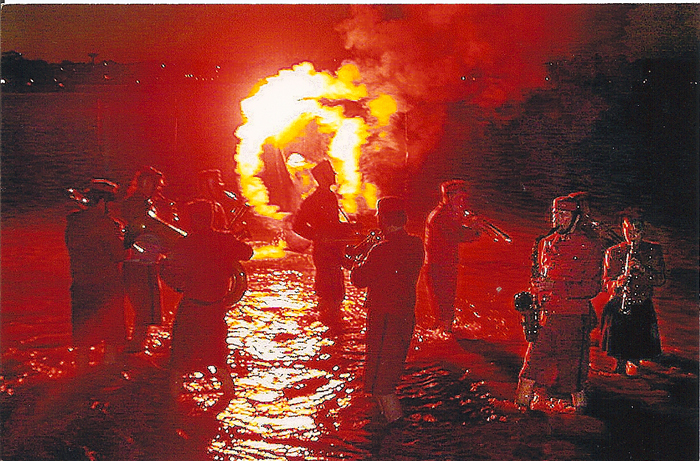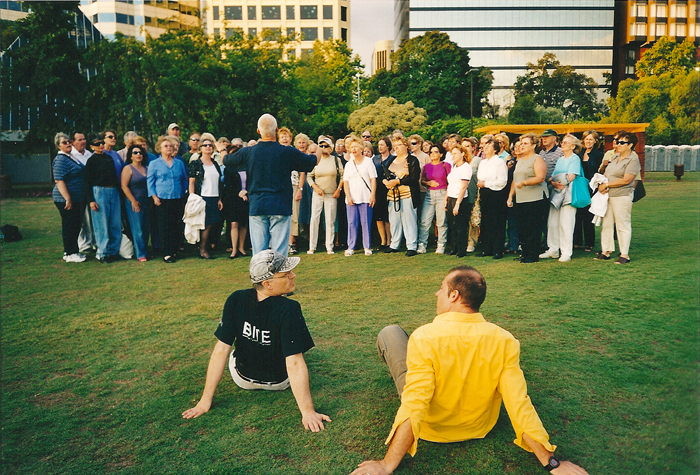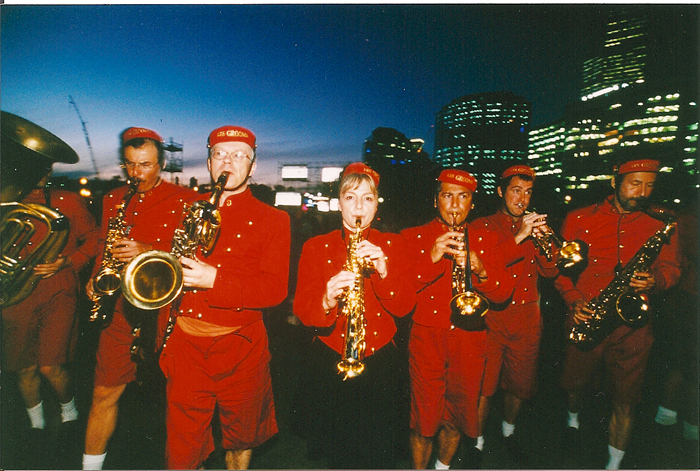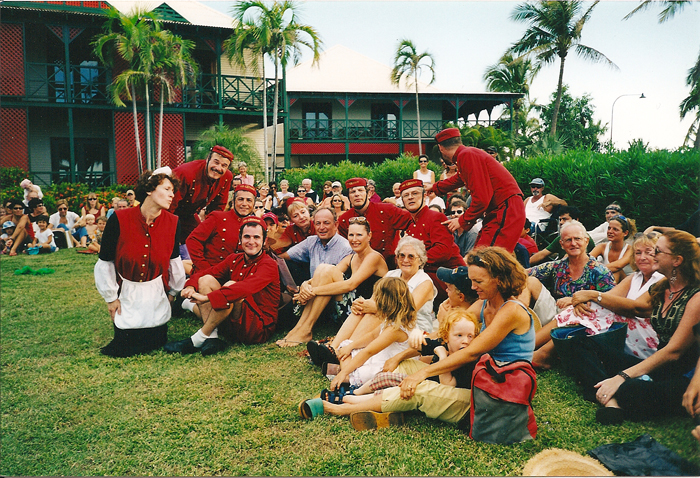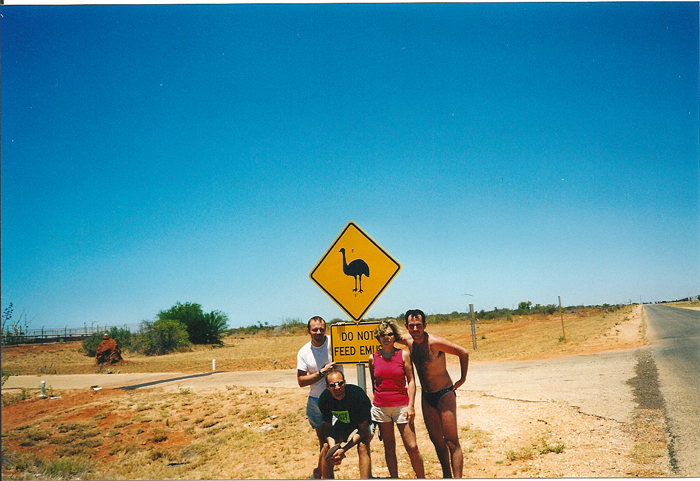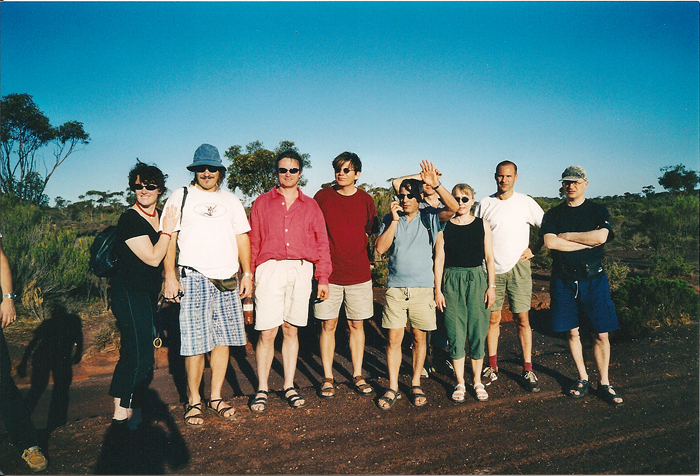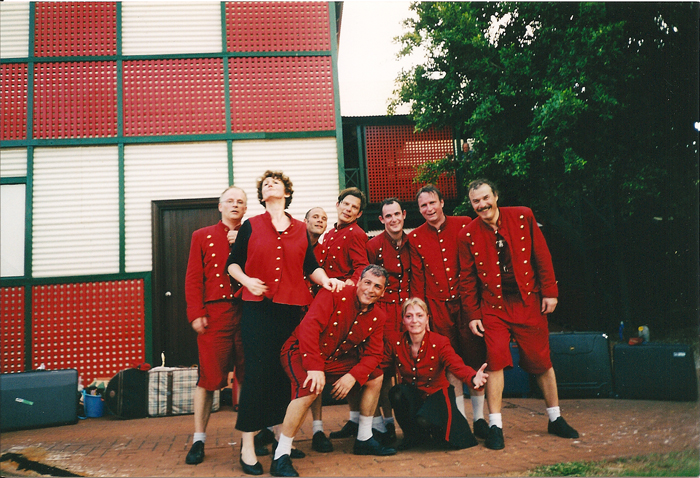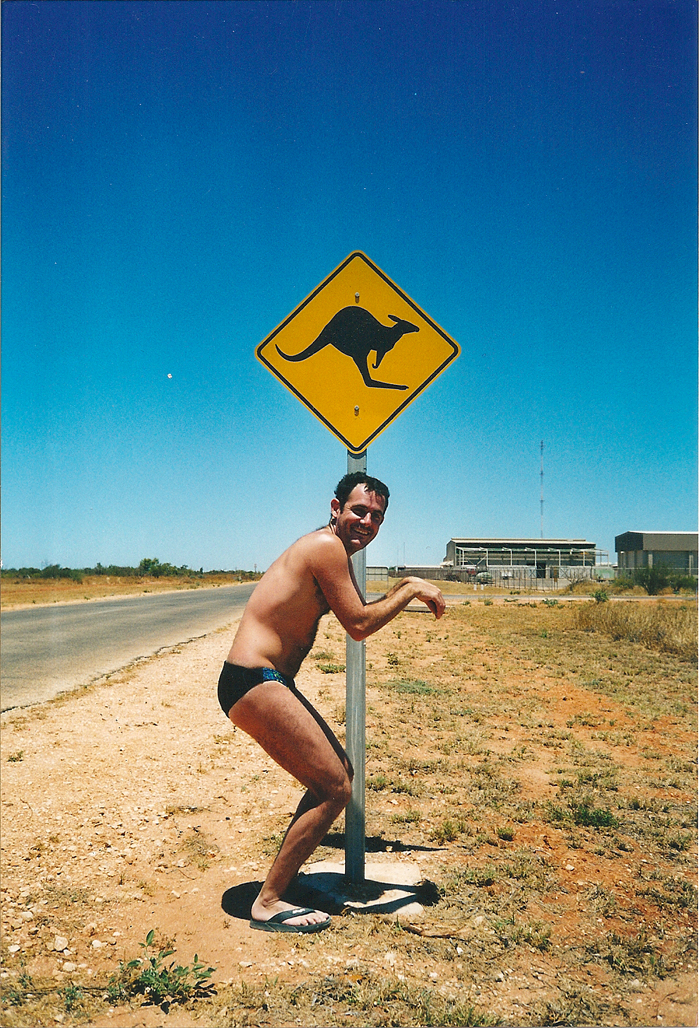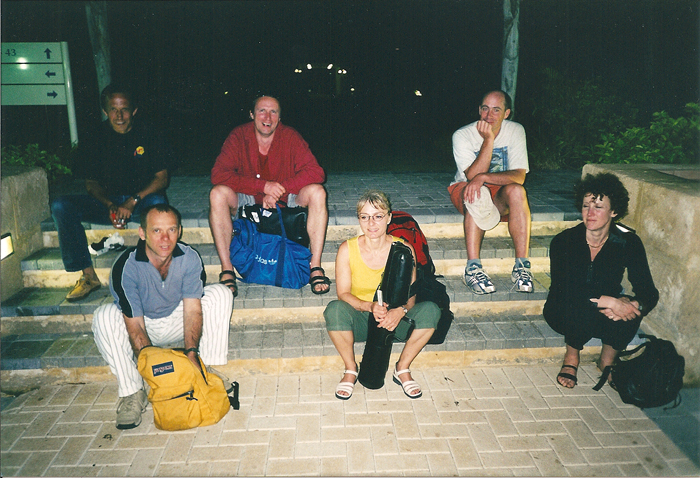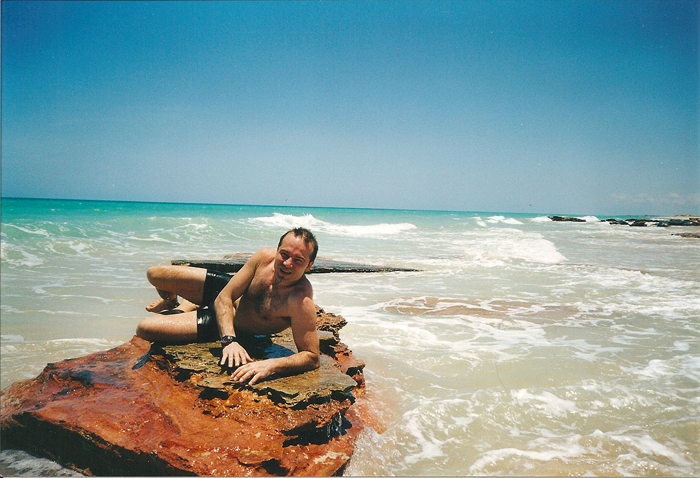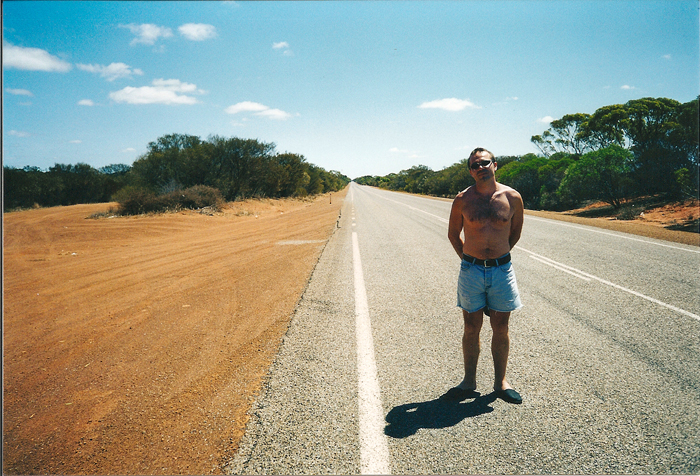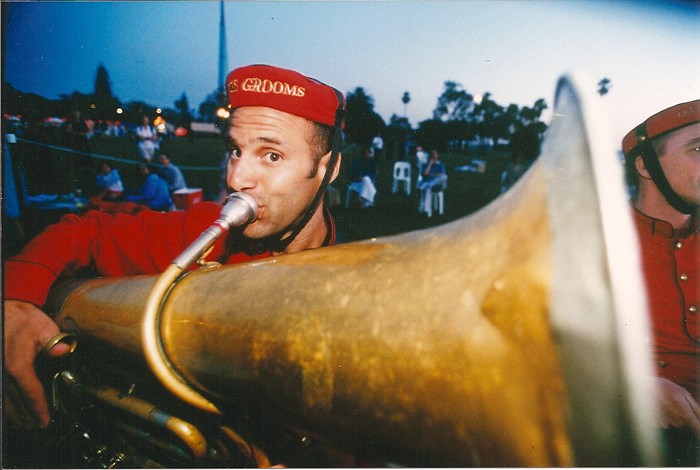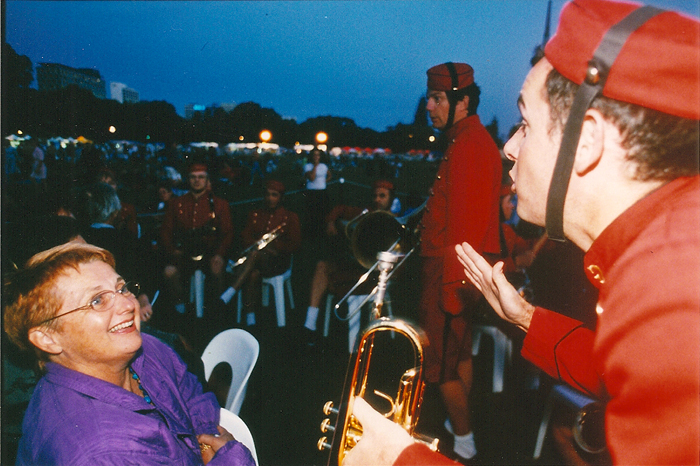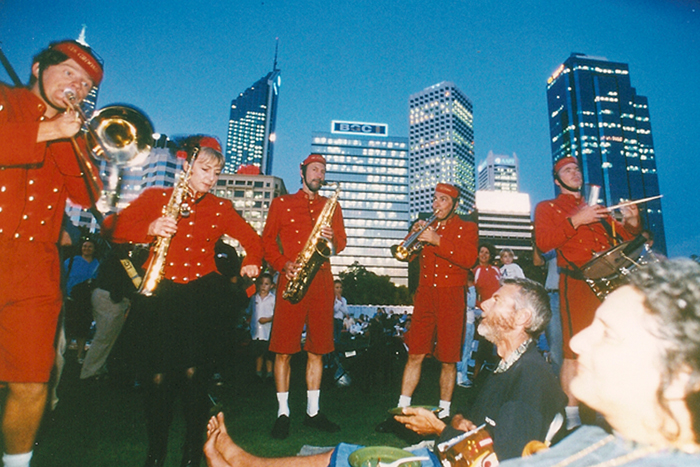| Australia |
|
Les Grooms in Australia February 2003
The tour's origins go back to March, 2002 when an English programmer named Bill Gee advised us to contact the Perth festival, which could be interested in our show (they have a version of Wagner's The Twilight of the Gods in the festival). The answer isn't long in coming and the director of the festival seems very interested. He sends 2 people to see the show at festivals in Chalon sur Saône and Hasselt ( Belgium). After some months of negotiation, the tour is finalised in December, 2003. The idea is to celebrate the 50th anniversary of the festival by introducing a policy of decentralisation. Our show will therefore be performed in different parts of the State of Western Australia (of which Perth is the capital). We will stay 24 days in the area, and will play a total of 12 times with 3 different shows in 4 cities: - February 1st and 2nd; Kalgoorlie (The Threepenny Ring) - February 4th: Broome (The Tragic Flute) - February 6th- 11th: Mandurah (The Threepenny Ring and La Barronade). - February 13th-16th: Perth (Grooming the Audience and The Tragic Flute).
Kalgoorlie (February 1st, 2nd and 3rd) It's the most unusual place of this whole Australian tour: Sean Doran (director of the festival) has had the idea of making us perform the spectacle on the site of the biggest open-air gold mine in the world. There's a clear link with our show; The Ring of the Nibelungen features hideous dwarfs who forge gold in the depths of the earth. This town, which is situated 600 km of Perth, was, at the end of the last century during the gold rush, the largest town in Australia. Things have calmed down considerably since then, but there is still an important mining industry. The town is more renowned for its "skimpies" (topless barmaids) and its brothels than for its cultural activity. And it's the first time the festival has organised an event here. We welcome the challenge of introducing the population to opera, but we're a little apprehensive, especially when we realise that there is hardly any advertising for us in town . We put up our set in the immense hall of a disused mine which is now transformed into a museum (the Hall of Fame). Apparently we have 20 advance bookings. In the end, to our great relief, a hundred or so spectators arrive. They are seated on carpets or small stools, but we have a problem with several obese people for whom we have to find chairs. We soon have a good rapport with the audience and there is a great deal of laughter. Our very approximate English (the whole show has been translated) goes down very well with the Australian public. There is even real aborigine (one!) in the audience ! After the show, a small drinks-reception is organised in our honour. The sun goes down behind derricks and the effect is sumptuous. Several important people have made the trip from Perth: there is the Minister for Regional Affairs ( Tom Stephens), the director of the festival, the director of the Alliance Française and journalists from the national press. There are even some dignitaries from the mining industry). They all loved the show, and we are delighted by this first experience of Australia. The second show is somewhat more bizarre: after a huge thunderstorm, the electricity is cut and it's necessary to delay the performance by one hour. Only half the power comes back on and all our lighting effects are wasted. The audience is less numerous but just as enthusiastic. It's regrettable that the pre-show marketing wasn't better. Before leaving for Perth, some of us have plans to visit the gold mine, others will eat kangaroo meat together with the aborigines, and some will explore the bush.
Broome (February 4th) Broome is a seaside resort some 2500 km north of Perth. The thing that strikes us immediately is the heat: it's close and very humid. Since we're playing outside, it's lucky that we foresaw shorts which go with the rest of our costume. Once again we are not optimistic as to the size of the audience. As in Kalgoorlie, it's the first time the festival has been here. We think of improvising a parade through town to advertise our presence. Then we realise that the town consists of only 2 streets, both deserted and overbearingly hot. In fact the total population of the state of Western Australia is only 3 million inhabitants, for a surface area 7 times that of France. And 85 % of the population live in Perth! On the day itself, some 200 to 300 people arrive from we don't know where, equipped with rugs to sit on and picnic-hampers (picnicking is a national sport in Australia). The Minister for Regional Affairs has once again made the trip, in his private jet. As soon as we begin, perspiration pours down our faces and continues to do so for the whole show. The audience is very soon on our side and stimulates us to play at full tilt despite the oppressive heat. Our singer nearly faints in the middle of the performance. We've never played in such a climate! In the end we are exhausted, but happy that the large audience was so enthusiastic. After the performance (as was to be the case after all subsequent performances), a reception is organised in our honour, with Australian wine and petit fours. The Minister is very happy with us and we sing him a short medieval air in his honour.
Mandurah (6th - 11th February) Mandurah is a seaside resort 80 km south of Perth and it is here things start to get serious things since we are programmed in the Mandurah Opera Festival together with Steve Reich and an Australian company. This time our décor is set up on the stage of a magnificent new theatre (the Boardwalk) which is made entirely from wood and glass, and faces the sea. Many opera specialists, festival programmers as well as other people who have travelled a long way will be in the audience. Our egos have been grossly inflated by the appearance of an article in the national press which praises us wildly. On the evening of the 1st, many sponsors and officials are scandalised at the idea of having to sit on the ground, and they demand to have seats. We stand firm while our Australian organiser hides in the toilets out of fear of having to confront them. The theatre is completely full on the first night. It is far too warm and the spectators sit tightly squeezed –up and crossed-legged on the carpets. Nevertheless, the reception is again more than friendly. This first performance is only average on a technical level, but there is a great energy. The Australian audience is as usual extremely positive, probably due to our very strong French accents. One Australian has the theory that an Australian audience feels more at ease with an unfamiliar art form when it's presented in this informal way. Every evening, there is a reception after the show (Siegfried's Supper) where the public can have a drink with the artists and sample Wagnerian specialities (sausages and beer). It's fun for us to be able to meet the spectators and talk with them. We are especially proud of our meeting with members of the Sydney Wagner Society; they've put our programme on their web-site. The festival sponsors also welcome their individual guests before the show with a drink or two. During one of the performances, a spectator comes into the theatre completely drunk, begins dancing to the music and finally vomits into one of our hats!!! One weekday evening, we have to give an outdoor performance (of La Baronnade) prior to a firework display. Our performance consists of surprising the spectators by planting our opera singers in the audience. At the end of the show, a local choir which is also hidden in the crowd surprises the audience by performing one of Wagner's choruses. The choir, which we met beforehand, is weak technically, but they're so thrilled to participate that it's great in the end. We finish our performance with our feet in the warm waters of the Indian Ocean playing Nino Rota's 8 and 1/2.
Perth (13th - 16th February) To celebrate its 50th anniversary, the festival of Perth is putting on for the first time in this country an Australian production of Wagner's Twilight of the Gods. Since the theatre doesn't have a large enough capacity, a huge screen has been installed in the park to broadcast the opera live. Sean Doran's idea is that we perform in front of this screen during the interval. Following our experience in Mandurah, we've worked from the beginning with an Australian choir of 100 chorus-singers in order to surprise the spectators. Our singers are also hidden throughout the park: the soprano is supposed to be a German tourist, the baritone is selling wine from a stall and the tenor is a technician on scaffolding 5m high. The repertoire is based around Wagner's music. All goes well, even if the show is a bit long and a bit shambolic, probably due to our fatigue... The 100-person choir impresses with its Sailors'Chorus from the Ghost ship which they've learned specially for the occasion. They follow it up with a Zulu song! It's always great to devise something with local people. They invite us to a slap-up meal, and we exchange addresses and musical scores. The last day, we finish with the 117th performance of The Tragic Flute in the centre of Perth. We sell all of our 35 CDs and 50 programmes. With this tour, the Grooms have now visited their 5th continent (23 countries since 1985). We'll rarely have a tour that goes as well as in Perth: the Australian hospitality was excellent from the beginning to the end of the tour. The festival's young team of workers were fantastic and treated us like kings; they always put us in the best hotels, they organised luxurious receptions in our honour, and were extremely well organised in every respect. The press was also very much in evidence (see accompanying articles). There were of course some regrets: regrets that we didn't meet more Aborigines; regrets that the audience wasn't as large as it might have been in Kalgoorlie due to lack of advertising; regrets that we couldn't play on the east coast. If there's one person we ought to thank in particular, it's the director of the festival, Sean Doran, who took a risk on us by booking us for 12 performances in high-profile situations when the show was not even finished. He's leaving the festival this year to become director of the English National Opera (the biggest opera theatre in England). We'd also like to thank the AFAA without whom this tour would not have been possible. Once again, thanks for having had confidence in us despite the tour being arranged at the last minute. The Alliance Française and the cultural ambassador supported us by being there throughout our journeying,, and we'd like to thank them (reception in our honour held in the French Alliance). Next year, a tour is planned during the same period to the Festival of New Zealand with the possibility of playing again in Australia (Adelaide), and we hope that a further collaboration with the AFAA will be possible. |
